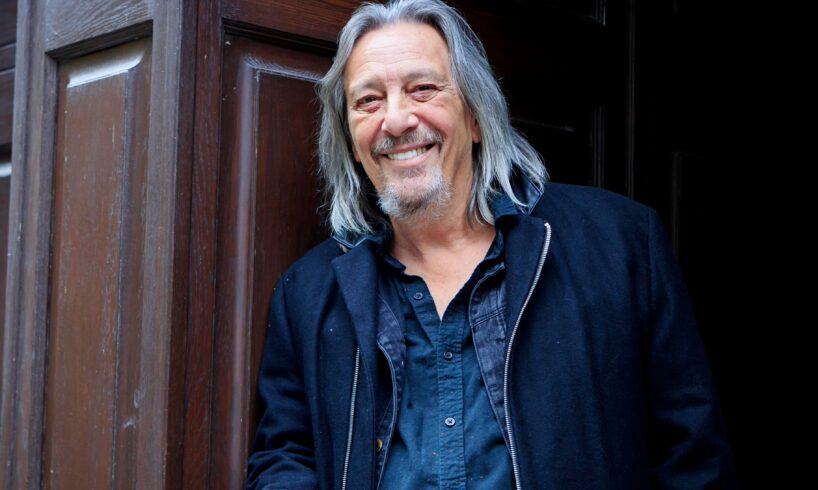
Open this photo in gallery:
Montreal-based progressive folk-rockers Harmonium were superstars in Quebec in the second half of the 1970s and a rare band from the province to achieve recognition in the U.S.Alain Roberge/The Canadian Press
When CBS Records offered influential Québécois rock group Harmonium $1-million to re-record its songs in English, most of the band was in favour of the prospect. But chief songwriter and lead singer Serge Fiori said “non,” stopping the deal cold.
In the second half of the 1970s, the Montreal-based progressive folk-rockers were superstars in their home province, had success in the rest of Canada and parts of Europe, and were a rare Quebec band to achieve recognition in the United States.
In an era when progressive rock flourished in the hands of egg-headed conceptualists such as Yes, Rush and Genesis, the poetic abstractions, sophisticated arrangements and pastoral rhapsodies of an English-singing Harmonium might well have struck gold internationally.
The fluently bilingual Mr. Fiori recently joked that he was “nuts” to have refused the cash. The actual answer had to do with creative integrity.
“One million dollars is a lot of money today, and back then it was gigantic,” said Serge Grimaux, Mr. Fiori’s manager for 36 years. “But he could not artistically carry the message in English he wanted to carry in French.”
Mr. Fiori, an uncompromising visionary, dedicated Quebec nationalist and beloved, towering cultural icon in his home province, died June 24. It happened in the early hours of Quebec’s Saint-Jean-Baptiste Day in his studio at his home in Saint-Henri-de-Taillon, Que. He was 73 and had suffered a long, undisclosed illness.
Open this photo in gallery:
Mr. Fiori was seemingly indifferent to his elite status as a rock star and uncomfortable with adulation.Pierre Côté/The Canadian Press
The mellow-voiced only son of a Francophone mother and an Italian-Canadian father recorded three studio albums with Harmonium, beginning with a self-titled debut in 1974 alongside fellow founding members guitarist Michel Normandeau and bassist Louis Valois. The hit single Pour un instant jump-started a career.
During its short-lived run, the band sold out theatres across Canada, played arenas in Quebec and toured with Supertramp in Europe. (Harmonium was big in Switzerland.)
On Saint-Jean-Baptiste Day in 1976, Harmonium and its Québécois rock-band competitor Beau Dommage performed on Mount Royal for 400,000 people
To many in Quebec, Mr. Fiori was Guy Lafleur with a 12-string acoustic guitar and the long-haired hero of the sovereigntist seventies. Though he composed no nationalist anthems, his lyrics at times alluded to the movement. On Pour un instant: “Des inconnus vivent en roi chez moi” (Strangers live like kings in my home) and “Moi qui avait accepté leurs lois” (I who had accepted their laws).
“He spoke flawless English, but he lived in French,” said Terry DiMonte, long-time broadcaster, now retired, with Montreal anglophone classic-rock station CHOM 97.7. “He had nothing against Canada, but he believed in Quebec’s right to separate and form a nation of its own.”
Harmonium’s second album, 1975’s Si on avait besoin d’une cinquième saison (better known as Les cinq saisons), was a conceptual record about the four seasons (and a fictional fifth). It won Harmonium Juno Awards for top group and bestselling album. Rolling Stone magazine later ranked it 36th in its list of the 50 greatest progressive rock LPs of all time and hailed it as “the pinnacle of the entire folk-prog movement.”
Harmonium’s final studio release, 1976’s L’heptade, is considered one of the defining moments of Quebec rock. The double-album opus, particularly revered in La Belle Province, was released within hours of the historic sweep into power by René Lévesque and the Parti Québécois in 1976. “It was a coincidence, but Serge believed in synchronicity,” Mr. Grimaux said.
All three Harmonium albums were recognized in Bob Mersereau’s 2007 book, The Top 100 Canadian Albums. Mr. Fiori considered L’heptade to be his finest work.
“He told me, ‘After that, what else can I create?’” recalled Louise Thériault, the musician’s biographer.
Open this photo in gallery:
Mr. Fiori’s national funeral is scheduled for July 15, 3 p.m., at the Salle Wilfrid-Pelletier at Place des Arts in Montreal.Graham Hughes/The Canadian Press
Mr. Fiori was a rock star seemingly indifferent to the elite status.
“I don’t want to be rich, no thanks,” he told The Globe and Mail’s B.D. Johnson in 1977. “We’re not making much money out of our music. We had to pay CBS Records half the [$90,000] cost of making our last record. And whatever surplus we earn is reinvested into what we’re doing.”
In the fall of 1978, Mr. Fiori and Harmonium accompanied Mr. Lévesque on the premier’s goodwill mission to San Francisco selling the idea of an independent Quebec. For Harmonium, the trip was both an act of musical diplomacy and a chance to establish a beachhead in the United States.
The band’s first ever concert south of the 49th parallel was scheduled for the 1,984-seat Zellerbach Auditorium at the University of California, Berkeley. The showcase was called off, however, when the truck hauling the band’s instruments and equipment got lost on the way from Canada.
Harmonium instead played a hastily scheduled smaller show in a less prestigious venue in Los Angeles. The performance was captured in the National Film Board of Canada documentary Harmonium en Californie, directed by Robert Fortier.
In 1978, Mr. Fiori teamed with singer-songwriter Richard Séguin for the album Deux cents nuits à l’heure, which won three Félix awards. François Couture later wrote for the online AllMusic that the one-off collaboration brought a “gentle close to the heyday of art rock in Québec.”
Harmonium’s relentless touring left Mr. Fiori emotionally and physically exhausted by the end of the decade. “I take my momentum and I hit the wall,” he had sung in French on the 1976 song L’exil (Exile).
He believed a lone LSD trip had caused a neurotransmitter disorder. Experiencing anxiety and on-stage panic attacks, he quit the band.
“Everything crashed in ’80,” he said later, referring to his own battered psyche and the failed Quebec independence referendum of that year.
According to Ms. Thériault, a close friend who wrote the 2013 biography Serge Fiori: S’enlever du chemin, the musician did not seek professional help initially.
“He was lonely, but he didn’t talk about it,” she said. “He thought maybe he was going crazy, and he was afraid of being institutionalized.”
He would re-emerge in 1983, but as a songwriter for other artists and in the studio for his own projects. He wrote and sang the theme song for the Montreal comedy festival Just for Laughs, composed film scores, put out three albums of Indian mantras and released the solo LP Fiori in 1986.
It took him 28 years to release a follow-up, 2014’s well-received Serge Fiori, his final record.
“Serge told me that the guitar he kept in a corner had called him over, and that when he picked it up the songs spilled out of him,” CHOM’s Mr. DiMonte said. “Seven days later, the guitar told him to put it down. He said he hadn’t picked it up since.”
Though charismatic, Mr. Fiori was uncomfortable with adulation. He wore a hat and glasses to disguise himself when visiting the Montreal Forum to see his beloved Canadiens.
“He was a rock star, but he was also thought of as a guru, and he didn’t like that at all,” Ms. Thériault said.
Mr. Fiori resisted calls for a Harmonium reunion, just as he had no interest in encores to close concerts. Before the final number, he would sometimes tell the audience that as the song progressed, more and more musicians would depart.
“I will invite you to continue singing, and then I will leave the stage,” he would instruct, according to Mr. Grimaux. “That will be the encore. It will give you the spirit of what was.”
He was born March 4, 1952, in Montreal’s Little Italy neighbourhood. Growing up, the only child of the former Claire Dauphinais and bandleader Georges Fiori wanted to be a hockey player. That was not an uncommon dream for a kid in Quebec, but this pipsqueak Montrealer was lucky enough to live near hockey legend Maurice (The Rocket) Richard.
“Maurice would invite Serge to skate in his backyard rink on Saturday afternoons,” Ms. Thériault said. “He would give him tickets behind the Montreal Canadiens bench to watch him play at the Forum.”
Open this photo in gallery:
Mr. Fiori’s friendship with hockey legend Maurice Richard lasted for many years, with the Rocket often bringing him to games at the Montreal Forum and seating him by the players’ bench.Supplied
He strapped on his first guitar at the age of 15 but also subbed in with his father’s ballroom orchestra when a keyboardist or a singer failed to show.
The first radio station to play Pour un instant was Montreal’s album-orientated CHOM, which at the time was experimenting with bilingual hosts and playlists. The band filled Toronto’s Massey Hall, Ottawa’s Southam Hall and other venues outside Quebec.
“You’d go on stage and there’s like 3,000 people at the Orpheum in Vancouver,” Mr. Fiori recalled recently on the podcast High Fidelity/Haute Fidélité. “And they sing the words in French, and that’s very rare.”
On Feb. 24, 1977, Harmonium played the first of 10 sold-out concerts at Montreal’s historic Outremont Theatre. Montreal Gazette rock critic Juan Rodriguez wrote that Mr. Fiori, dressed in white racing car overalls and with long hair that flowed with the rhythms, “cut a somewhat Svengali-like figure.”
He was a diminished figure in 1999 when four young women accused of assaulting the 46-year-old fading rock star and girlfriend Marie-Jocelyne Dion during a late-night scuffle in Montreal two years earlier were acquitted of all charges. Covering the tabloid-worthy trial for the Montreal Mirror, Kristian Gravenor described Mr. Fiori as a “weathered, morose man, an impression reinforced by his sad, monotone voice.”
Ten years later, he met with a psychiatrist for the first time. A change in the medication used to calm his anxiety enhanced his lucidity. In 2014, the Gazette’s Mr. Rodriguez wrote that Mr. Fiori was in good spirits and that his serene comeback album “positively glows.”
In 2020, conductor Simon Leclerc and 68 members of the Montreal Symphony Orchestra recorded instrumental versions of songs from the Harmonium catalog. Histoires sans paroles − Harmonium symphonique was co-produced by Mr. Leclerc and Mr. Fiori.
Mr. Fiori appreciated Steely Dan, Joni Mitchell and, most of all, James Taylor. He once loaned the Sweet Baby James balladeer his 12-string guitar for a Montreal concert.
“Serge was in seventh heaven,” Ms. Thériault said.
Ms. Thériault remembers the musician as the funniest she had ever met.
“We’d be sitting at the back of a movie theatre, and when the lights down he would start making trumpet noises and imitating characters on the screen. The people in the theatre were cracking up.”
Ultimately, Mr. Fiori was a sensitive, sublimely talented star more comfortable in the dark than in the limelight. His national funeral is scheduled for July 15, 3 p.m., at the Salle Wilfrid-Pelletier at Place des Arts in Montreal.
He leaves partner Hélène Lévesque; and his close friend for more than 50 years, Marie-Claire Sauvé.
You can find more obituaries from The Globe and Mail here.
To submit a memory about someone we have recently profiled on the Obituaries page, e-mail us at obit@globeandmail.com.
Editor’s note: A previous version of this article incorrectly stated that Harmonium’s second album was released within hours of the historic sweep into power by René Lévesque and the Parti Québécois in 1976. Its third and final album was released at this time.





